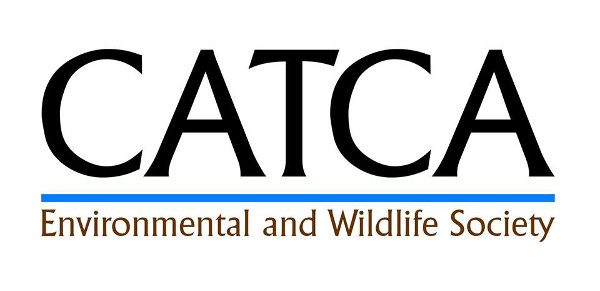

Ban of Canadian Seal Products
There is a EU movement to ban Canadian Seal products.
In 2003, the Canadian government announced that they would be killing for the next three years, one million baby harp seals (plus grey and hooded seals). Up to then, about 60,000 were clubbed every year, shoot or killed with a "hagapik" (harpoon).
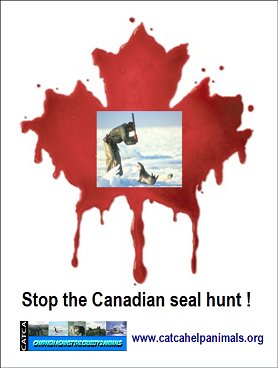
With the new quota, this turned out to be the largest marine mammal slaughter in the world.
A 98% of the seals killed are between 14 days and 12 weeks old. Mostly are baby harp seals and they are killed only for their fur, of which 80% ends up in Norway, to be sold mostly to Russia and China.
This year during the spring, due to Global Warming, 260,000 baby harp seals drowned. The ice floes wasn't strong enough to support the weight of a baby seal a couple of weeks old, so it would break and throw the cub seals to the frozen water.
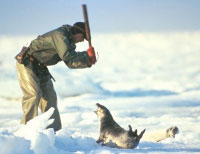
Despite this tragedy and the pleas of international organizations and people worldwide, the Department of Fisheries and Oceans (DFO), decided to go ahead with the seal hunt starting of April the 2nd 2007, but reduced their quota from 325,000 harp seals to 270,000, plus 8,200 hooded seals and 9,000 grey seals!
Next year, in 2008, another seal massacre will happen next spring in the North of Quebec, New Foundland, Labrador and Prince Edward Island.
This year, the seal hunt ended up with 215,388 seals slaughtered, according to the DFO statistics. There were not enough seals to reach their original quota.
This slaughter will happen until the EP, more European countries and other countries worldwide, ban all Canadian seal products (even if they don't get/use those products). That kind of international pressure it's the key we need to stop this atrocity.
From Canada nothing can be achieved, and that is a hard lesson we animal welfare activists in Canada have learnt with the unmoral decision of the DFO this year to go ahead with the seal hunt, despite knowing that over a quarter million baby harp seals had already perished a couple of weeks before.
We can't stop this massacre by our own!
We need your help to save our Canadian baby seals!
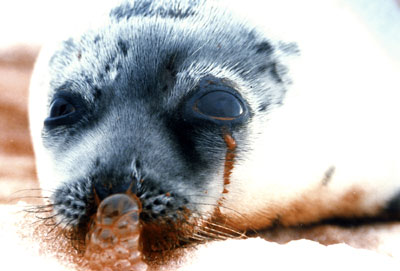
Ban Facts
Belgium was the first EU country to place a ban in all seal products on the 25th January 2007.
Holland was the second country in July 18th, 2007.
EU countries (Luxembourg, Germany, Austria, UK and Italy), have already taken steps to ban the trade in seal products.
The USA, Mexico and Croatia have banned the trade in seal products. The US in 1972, followed by Mexico (both through a Marine Mammal Protection Act, which prohibits the import/export and marketing of all marine mammal products), and Croatia in 2006.
The European Parliament has passed a motion banning the import of seal products and sets as a larger goal an EU-wide ban (That is where we need to press the issue now!), and if possible make it for all seal products, including from Namibia, Russia, Norway and Greenland.
The European Union introduced in 1983 a ban on seal products derived from whitecoats (newborn harp seals, less than 12 days old) and bluebacks (young hooded seals, less than one year old). Unfortunately, this ban is not effective in order to stop the current trade of harp and hooded seal pelts in Europe. Seals are hunted when they are few days older and their pelts can be legally traded in the EU, which happens to be one of the largest market for seal products.
In December 2005, the Dutch Parliament iniciated a legislative proposal to ban the import, export and all marketing of harp and hooded seals and their derived products.
The Resolution asks the European Commission to produce a legislative proposal for a seal ban. In October 2006, the European Parliament adopted another resolution on the Animal Welfare Action Plan which calls for an EU wide ban on seal products.
Italy introduced in 2005 a temporary ban on seal products. A governmental proposal for a permanent ban is awaited.
Last year, the German Parliament voted unanimously on a motion urging the government to ban seal products.
In September 2006, the European Parliament called for an end to the trade in seal products. A total of 425 (of 732) Members of the European Parliament signed a Written Declaration setting a record for the highest number of signatures on any single Written Declaration.
The Resolution asks the European Commission to produce a legislative proposal for a seal ban.
In October 2006, the European Parliament adopted another resolution on the Animal Welfare Action Plan which calls for an EU wide ban on seal products.
The Parliamentary Assembly of the Council of Europe called in November 2006 on its Member States to introduce national bans on seal derived products.
The European Parliament adopted a Resolution in 2006 which asks the European Commission to propose an EU-wide ban on seal products. Following that, the European Commission asked the European Food Safety Authority (EFSA), to prepare a study on the welfare aspects of the killing and skinning of seals.A working group of EFSA's Animal Health and Welfare (AHAW) Panel is preparing a report and draft opinion drawing on the available scientific data and information.
EFSA met with stakeholders on 4th October 2007, to discuss work in progress on this issue. Around 40 organisations from 11 countries attended.
All stakeholders have until 1st November 2007, to submit further data to be considered by the working group. EFSA aims to have their final report and a draft scientific opinion ready for consideration by the AHAW Panel at its December 2007 meeting.
Here are links to the important EFSA Report (December 6th, 2007) and Results of the EFSA Report (December 19th, 2007)
Now the European Commission requested another report, an "Impact Assesment Report" that will be released in February 2008.
This Impact Assesment Report, will be about how it affects the EU and sealing countries, and has to go through the Legislative and then the Parliament, then the Council of Ministers of each country and finally the EU, but when it is done and presented in February (most likely the middle of February), the EU will be able to decide if vote in favour or against the ban.
News
Environment Canada Initiates WTO Complaint Against European Restrictions on Seal Products WTO Reporter Thursday, September 27, 2007 ISSN 1529-4153 By Daniel Pruzin
GENEVA--Canada has initiated a World Trade Organization dispute complaint against legislation in Belgium and the Netherlands prohibiting the import and sale of seal products.
In a request for WTO consultations forwarded to the European Union Sept. 25, Canada charged the bans in the two EU member states violate WTO rules on most-favored-nation treatment and nondiscrimination between domestic and imported goods. The EU is responsible for handling trade disputes between WTO members and any of the EU's 27 member countries.
If Canada and the EU are unable to resolve the dispute within the next 60 days, Canada will be free to request the establishment of a WTO dispute panel to rule on its claims.
The European bans were instituted in response to protests from environmental and conservation groups regarding the practices of Canadian seal hunters. The groups charge the hunts are unacceptably cruel, with hunters sometimes striking baby seals with clubs and skinning them alive.
The United States adopted a ban on seal imports in 1972. As a result, nearly all of the seal skins harvested in Canada are shipped to Europe for processing and sale.
Canada's Department of Fisheries and Oceans has set a limit of 270,000 harp seals for this year's hunt. According to the International Fund for Animal Welfare, 2007 is the fourth consecutive year in which the Canadian government harvest quota has exceeded the amount of seals that can be removed without causing the population to decline.
In April Belgium adopted a ban on the import of all seal products. The Netherlands followed in July with a ban on the import and sale of products made from harp seals and hooded seals. The Dutch ban took effect on Sept. 11.
The actions prompted Canada's largest Inuit organization to petition the Canadian government to challenge the bans through the WTO. The group said it feared the EU would use the passage of the bans from Belgium and the Netherlands--and possible legislation from Germany and the United Kingdom--to pass an EU wide ban on in the import of seal products.
An EU-wide ban exists on seal products derived from whitecoats (newborn harp seals, less than 12 days old) and bluebacks (young hooded seals less than 1 year old). However, campaigners against the Canadian seal hunt charge the ban is easily circumscribed by hunters who wait a few days after the prescribed minimum ages to kill the seals.
Canada Files WTO Complaint Over Bans on Seal Products Wall Street Journal - USA Associated PressGENEVA -- Canada has brought a complaint to the World Trade Organization over Belgian and Dutch rules prohibiting the sale of seal products, trade officials said Wednesday.
Canada's annual seal hunt has long been condemned by animal-rights activists as cruel, and it is facing a number of possible bans on its seal products in Europe. Trade officials in Geneva had no further details about the dispute, except that it pertained to restrictions ...
http://online.wsj.com/article/SB119081201260739932.html?mod=googlenews_wsj
Canada Files WTO Case Against EU on Seal-Product Ban (Update1) Bloomberg
By Jennifer M. Freedman
Sept. 26 (Bloomberg) -- Canada lodged a complaint against the European Union at the World Trade Organization, saying Dutch and Belgian bans on seal products break global trade laws.
Belgium outlawed the manufacture and commercialization of all products containing seal on March 16, according to the European Commission, the EU's trade authority. Dutch lawmakers are expected to approve a ban within a month, while Italy and Luxembourg refuse to grant import licenses for seal products ...
You can help to keep us doing this high level personal and active lobbying!
Help Yupi
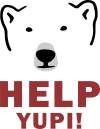
WAD

Ericka Ceballos is the proud Canadian Ambassador of World Animal Day. Click on the WAD logo above to check for the events that we will hold to celebrate the animals in Canada.
AD-AV Award!

Click to view larger
Campaigns Against the Cruelty to Animals


Follow us on Twitter!
Click on the button link above for important animal news, events and alerts.
Contact Info
Ericka
PO Box 16021
617 Belmont Street
New Westminster
British Columbia
V3M 6W6
Canada
Email Us!